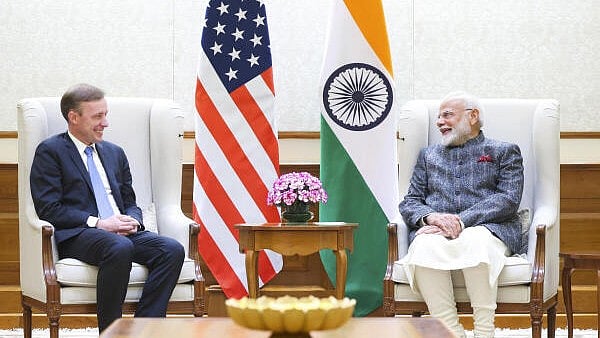
Prime Minister Narendra Modi during a meeting with US NSA Jake Sullivan, in New Delhi.
Credit: PTI Photo
New Delhi: President Joe Biden’s administration has updated the export control policies of the United States within the framework of the Missile Technology Control Regime (MTCR) to facilitate commercial space cooperation with India.
Prime Minister Narendra Modi’s National Security Advisor Ajit Doval on Monday hosted his US counterpart Jake Sullivan, who also had a meeting with External Affairs Minister S Jaishankar. Sullivan informed Doval that the outgoing administration in Washington DC had lowered the tech barriers to allow cooperation between private entities of the US to cooperate with counterparts in India in the commercial space sector.
Sullivan briefed Doval “on the updates brought out by the Biden Administration to US missile export control policies under the MTCR that will boost US commercial space cooperation with India”, according to a joint press release issued by the two sides after the meeting.
Biden, who will leave the White House on January 20, approved a national security memorandum to ease US export control within the framework of the MTCR to lower the barriers and clear the way for high technology cooperation with India, particularly in the commercial space sector.
The move will not only clear the way for significant advancement of cooperation in national space programmes of India and the US but will also help build a cooperative partnership in the sector, a source in New Delhi told DH.
The US and other G-7 countries launched the MTCR in 1987 to control exports of dual-use goods and technologies that could help make delivery systems for weapons of mass destruction, and thus limit proliferation of such weapons. The US helped India get admitted to the MTCR in June 2016.
The process to dismantle the barriers to high-technology cooperation between India and the US started with the 2008 civil nuclear cooperation agreement. The agreement and the clean waiver New Delhi had received from the Nuclear Suppliers Group had ended India’s ‘nuclear pariah’ status, which had continued since its first nuclear test in 1974.
Biden and Prime Minister Narendra Modi in May 2022 launched the Initiative on Critical and Emerging Technologies (iCET) to continue the process of lowering barriers in the US for advanced technology cooperation with India.
The US move was intended to help India lessen its dependence on Russia for advanced civilian and military technologies.
Doval and Sullivan led the iCET over the past two-and-a-half years and drove “concrete initiatives” between the two countries across a range of areas including Artificial Intelligence, Quantum Computing, semiconductors, telecommunications, defence and space, according to the joint press release issued in New Delhi and Washington DC. The current visit by Sullivan gave him and Doval “the opportunity to review ongoing progress in their high-level dialogue, including in diverse fields such as defence, cyber and maritime security”, it added.
When Modi and Biden met in Wilmington, Delaware on September 21 last year, they noted progress toward the first joint effort by NASA and ISRO to conduct scientific research onboard the International Space Station in 2025. They appreciated the initiatives and exchange of ideas under the Civil Space Joint Working Group and expressed hope that its next meeting in early 2025 would open additional avenues of cooperation. They pledged to pursue opportunities to deepen joint innovation and strategic collaborations, including by exploring new platforms in civil and commercial space domains.
Sullivan’s visit and his meetings with Doval and Jaishankar on Monday marked the last high-level engagement between New Delhi and the Biden Administration in Washington DC before Donald Trump’s inauguration as the 47th president of the US on January 20.
